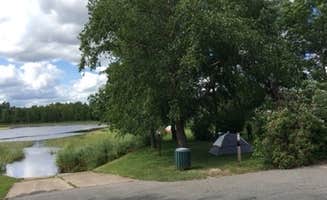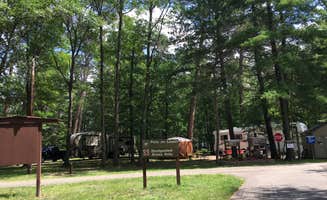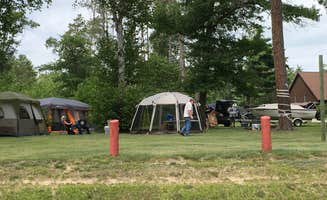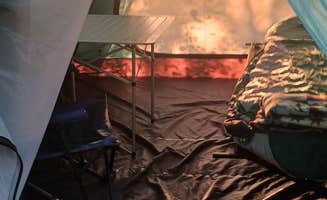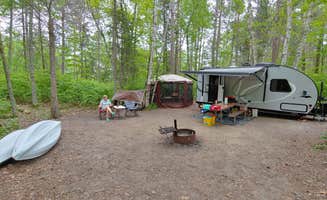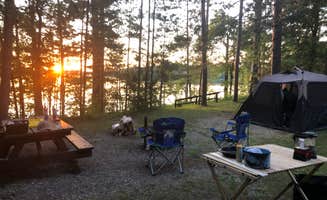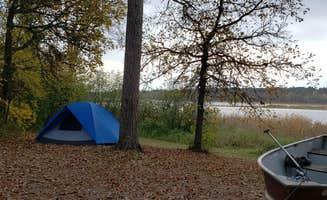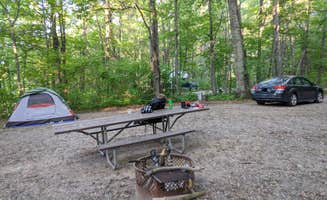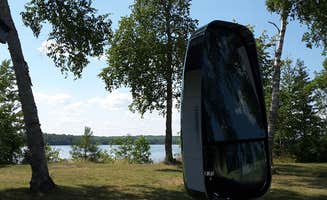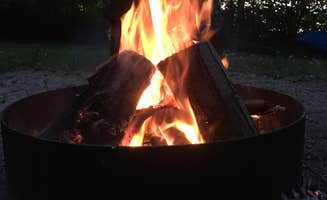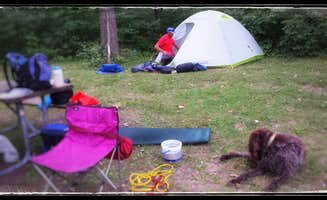The Deer River area sits at the southern edge of the Chippewa National Forest at approximately 1,300 feet elevation, where the Mississippi River flows through a landscape of pine forests, wetlands, and glacial lakes. Within 30 miles of Deer River, temperatures range from summer highs around 80°F to winter lows well below freezing. The camping season typically runs mid-May through October with mosquito activity heaviest in June and July.
What to do
Fishing access points: Multiple campgrounds near Deer River offer dedicated fishing infrastructure. Pokegama Dam Campground provides "fishing in the rapids below the dam, or in the still river water above it... via boat landing, the dam itself, and various fishing piers," according to Janet R. Walleye and bass fishing draws many campers to area lakes.
Hiking trails: Schoolcraft State Park Campground features "a hiking loop around the entirety of the park that's very easy, but it is a beautiful walk through peaceful red pine forest," notes Meg W. The park includes interpretive signs about local history and nature along its trail system.
Paddling opportunities: Paddlers can access both rivers and lakes from several campgrounds. Ball Club Lake offers boat-in sites, while Schoolcraft State Park includes "a campsite next to the Mississippi River for people canoeing," according to Mary K. Local rental shops in Deer River provide canoe and kayak equipment for day use.
What campers like
Quiet weekday camping: Visitor traffic patterns make weekdays ideal for solitude. At North Star Campground, Scott M. notes it "wasn't crowded on a weekend and really only the water sites were busy," suggesting even greater weekday availability. The 38 sites spread between north and south loops provide ample space.
Wildlife viewing: The forests around Deer River host diverse wildlife viewable from campsites. At Northstar Campground, Hans E. describes being "alone with the Loons and Osprey" noting that "other than an occasional motorboat on North Star Lake, the only noise was the cry of the loons and the call of an Osprey." Many campgrounds include waterfront sites with prime wildlife viewing opportunities.
Spacious campsites: Campers consistently mention the generous site dimensions. At Leech Lake Recreation Area, Allison K. reports their site "was enough room for a travel trailer, truck and probably another tent or screen tent. The other sites were close but not too close." The campground's layout maximizes privacy through strategic tree placement.
What you should know
Limited cell service: Connectivity varies significantly throughout the area. In the Marcell area of Chippewa National Forest, reception becomes increasingly spotty farther from main roads. Prepare for limited or no service when camping in more remote areas.
Reservation requirements: Popular campgrounds fill quickly during peak summer weekends. At Winnie Dam Campground, Scott M. recommends mid-week visits as "this place does clear out during the week so that would be the best time to go and stay here as it is less crazy on the water." Seasonal campgrounds like Trout Lake often maintain a high percentage of seasonal campers, limiting transient availability.
Mosquito preparation: The forest and lake environment supports robust mosquito populations, particularly in early summer. At Leech Lake Recreation Area, RK M. shares, "As expected in the woods, the mosquitos were thick, but we fogged our site and that took care of it!" Pack appropriate repellents and consider screened shelters for evening activities.
Tips for camping with families
Playground access: Trout Lake Campground includes "a swim beach which is a big attraction for kids," according to Nancy W. Several other campgrounds feature playground equipment, with Leech Lake Recreation Area offering what Allison K. calls "basketball courts, a huge playground that was amazing quality, shuffleboard, volleyball, badminton, and a picnic shelter."
Educational opportunities: Historical and natural features provide learning experiences for children. The Forest History Center near Pokegama Dam impressed Shari M., who noted they "saw a draft horse pulling logs for demonstration." This center highlights the region's logging heritage through interactive displays.
Swimming options: Not all waterfront campgrounds offer safe swimming areas. At Leech Lake Recreation Area, one camper mentioned the campground is "on a river and is not suitable for swimming," while others recommended Tioga Beach in Cohasset as an alternative "well worth the trip" for families needing swimming access.
Tips from RVers
Site characteristics: RVers should note the terrain and layout variations between campgrounds. Prairie Lake Campground offers full hookup sites for $44/night according to Melissa B. Meanwhile, at Schoolcraft State Park, Betty H. describes "large sites" with "the smell of pine and birch" filling the air, though these sites lack hookups.
Dump station access: Facilities vary across campgrounds with some offering on-site services while others require travel. At Trout Lake RV Park, jaime M. notes "the owner was very nice and even pumped out our sewage for us before we left," while other reviewers mention a $5/40 gallon pump-out service. Before arrival, confirm sewage disposal options if staying multiple days.
Level site availability: Many RVers highlight the importance of level sites in the region. At Trout Lake Campground, jaime M. appreciated that "we were able to pull right onto the gravel pad and it was level so we didn't need to take extra time to level out the camper." Ask about site leveling when making reservations, particularly for larger rigs.


